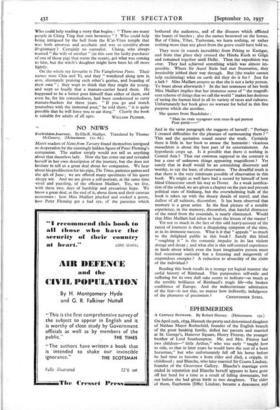NO NEWS
Forbidden Journey. By Ella K. Maillart. Translated by Thomas McGreevy. (Heinemann. 12s. 6d )
MANY readers of News from Tartary found themselves intrigued to desperation by the cunningly hidden figure of Peter Fleming's companion. The author simply would not tell us anything about that dauntless lady. Now she has come out and revealed herself in her own description of the journey, but she does not hesitate to tell us a great deal about her companion. We hear about his predilection for his pipe, The Times, patience games and the 4th of June ; we are offered many specimens of his queer sleepy wit. And we are given a self-portrait, at the same time vivid and puzzling, of the efficient Maillart. Yes, we live, with these two, days of hardship and precarious hope. We know a great deal, at the end of it, about them and their caravan economies : how Miss Maillart plucked and cooked a goose, how Peter Fleming got a bad eye, of the parasites which
bothered the authoress, and of the diseases which afflicted the beasts of burden ; also the names bestowed on the horses. But of China, Tibet, Turkestan, we learn nothing, or rather nothing more than any ghost from the grave could have told us.
They went (it sounds incredible) from Peking to Kashgar, and from that place they crossed the Hindu Kush to Gilgit and remained together until Delhi. Then the expedition was over. They had achieved something which was almost im- possible. Where Sir Aurel Stein had met frustration, they irresistibly jobbed their way through. But (the reader cannot help exclaiming) what on earth did they do it for ? Just for a lark ? Miss Maillart assures us that she is not a larky person. To boast about afterwards ? In the last sentences of her book Miss Maillart implies that her immense sense of" the magnifi- cent scheme of things that we call the world "makes her desirous of seeing the human kind in all its variety of races and cultures. Unfortunately her book gives no warrant for belief in this fine purpose which she ascribes.
She quotes from Baudelaire : "Mais les vrais voyageurs sont ceux-la qui partent Pour partir " And in the same paragraph she suggests of herself : "Perhaps I created difficulties for the pleasure of surmounting them ? " This and the quotation sound nearer the truth. Certainly there is little in her book to amuse the humanist : vicarious masochism is about the best part of its entertainment. An hypothesis crops up. Is it possible that there is nothing in Central Asia ? That our common supposal to the contrary is but a case of unknown things appearing magnificent ? Yet surely that in itself would be an astonishing discovery and worthy, to say the least, of observation. The dreadful truth is that there is the very minimum possible of observation in this book. We might as well have had a record by himself of how blind Gloucester smelt his way to Dover. As a weak justifica- tion of the ordeal, we are given a chapter on the past and present political state of Sinkiang, but the overwhelming bulk of the book is taken up with the dreary details of travel; and that dullest of all subjects, discomfort. It has been observed that memory is a great artist. In the final picture of a notable experience, in the memory, discomfort, that hateful distractor of the mind from the essentials, is nearly eliminated. Would that Miss Maillart had taken to heart the lesson of the master !
Yet not so much in the fact of this odd heavy account of the rarest of journeys is there a disquieting symptom of the time, as in its immense success. What is it that " appeals " so much to the delighted public in this book ? Surely this blind "roughing it" is the romantic impulse in its last violent dotage and decay ; and what else is this self-centred experience in lands about which even the least imaginative person must feel occasional curiosity but a festering and misgrowth of stupendous energies ? A reduction to absurdity of the claim of the individual ?
Reading this book recalls in a strange yet logical manner the awful history of Rimbaud. This purposeless self-exile and suffering for its own dull sake seems to indicate—as much as the terrible brilliance of Rimbaud's tragic life—the broken confidence of Europe. And the indiscriminate admiration of the feat—is not this, no matter how indirectly, indulgence










































 Previous page
Previous page